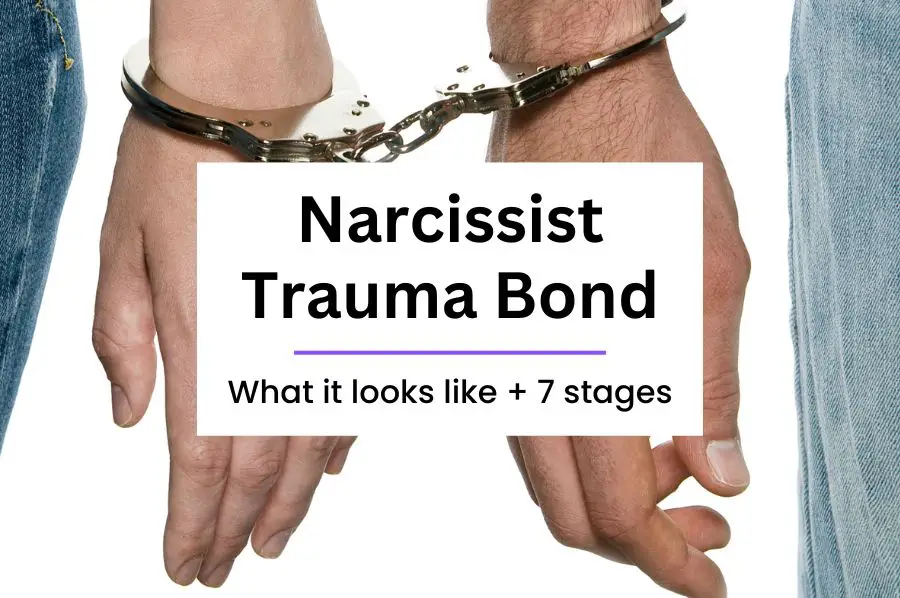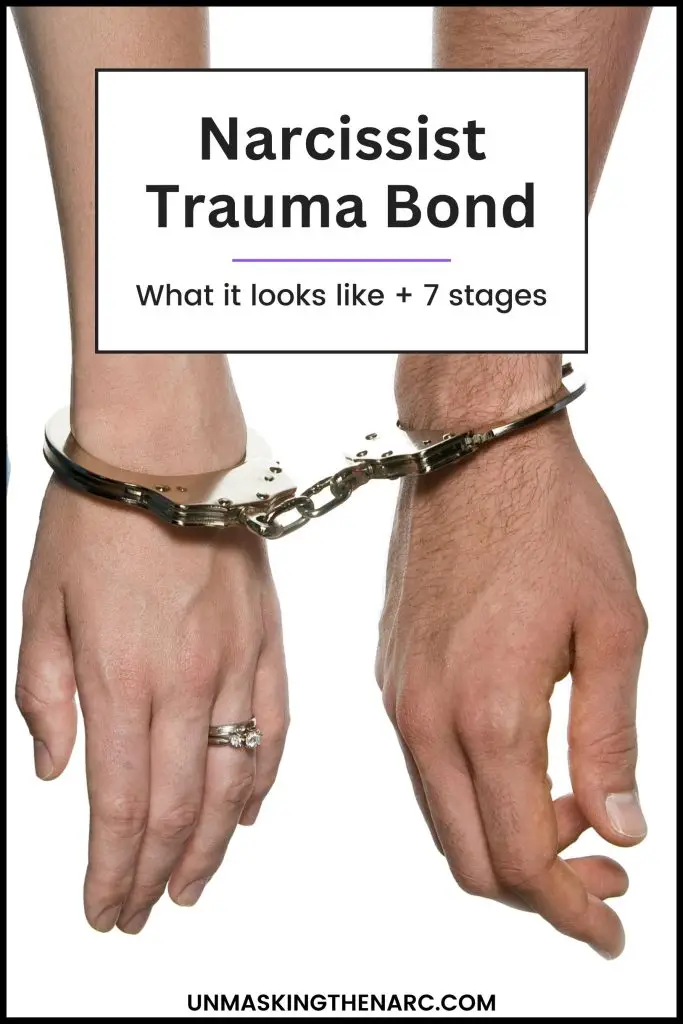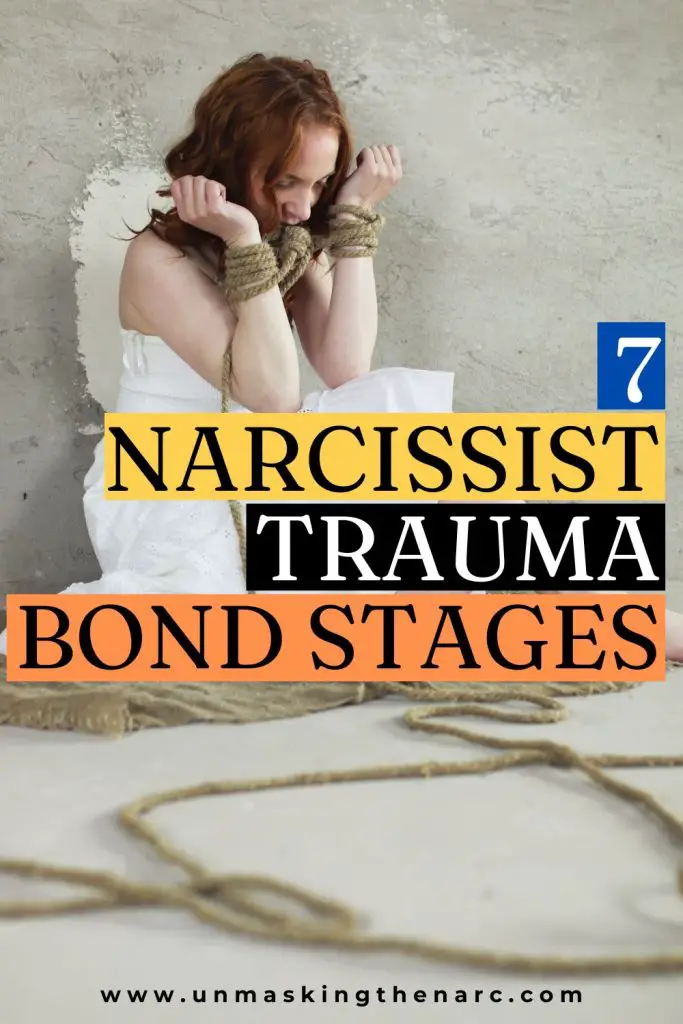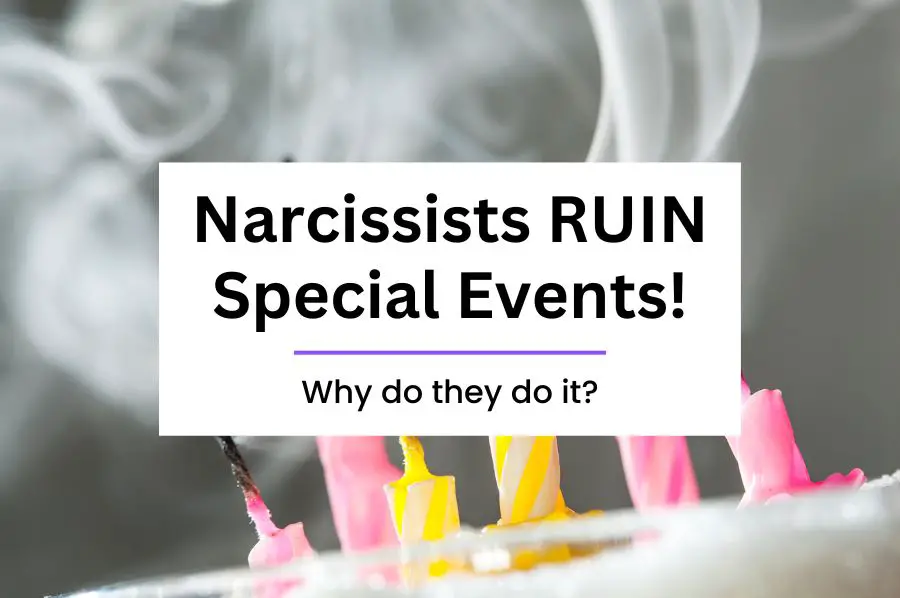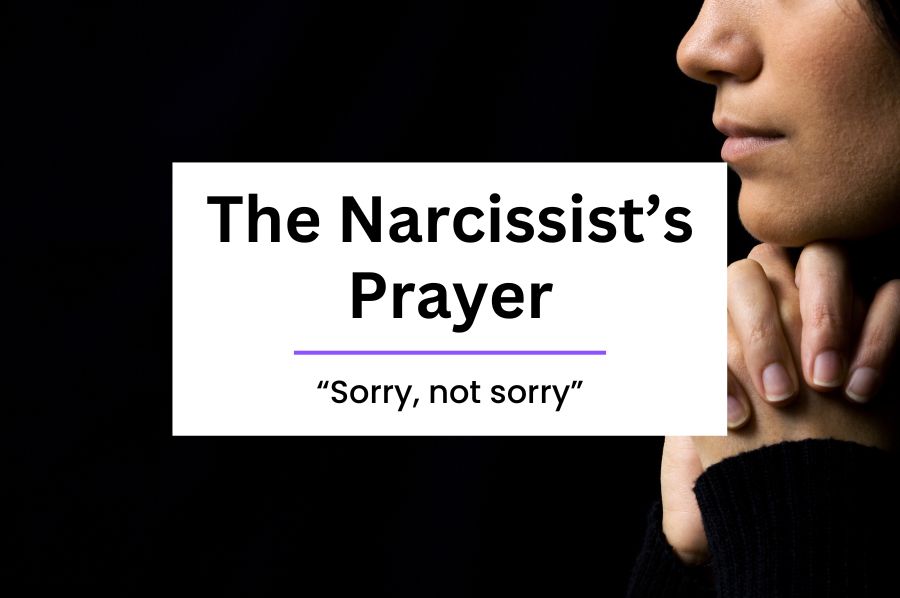Toxic and abusive relationships are incredibly convoluted situations, with narcissist trauma bonding being a crucial element in keeping people imprisoned.
When you’re in a relationship with a narcissist, your brain doesn’t even compute that the person who’s supposed to love you is in fact abusing you. Narcissists are highly skilled manipulators and are very methodical in the way they work to hook in their victims.
However, once we’re able to be honest with ourselves, we can admit that things weren’t right and that we often hid or justified the narcissist’s cruel and hurtful behaviours. Because, if we did admit those things to ourselves, they would completely decimate our fantasy image of who we needed that person to be for us and everything that went with that life.
Never again will I look in from the outside of another toxic relationship and think, “Why do they stay with someone who treats them so terribly?”
What does a trauma bond with a narcissist look like? To understand that we need to look at what a narcissist trauma bond is and how it is deepened through the 7 stages.
This post may contain affiliate links. For more information, see our disclosures here.
What Does a Trauma Bond with a Narcissist Look Like?

The Narcissist Trauma Bond Explained
Narcissist trauma bonding is where an abuse victim feels emotionally connected and even loyal to their abuser. The bond itself is formed through a repeated cycle of abuse, where the abuser has become the victim’s complete source of validation and security.
The bond is created and strengthened through intermittent punishments, which are then backed up with rewards. This psychologically reinforces that the abuser is the one who can provide relief from the person’s feelings of pain, despair and anxiety, even though the narcissist was the very cause of the pain in the first place.
INTERMITTENT REINFORCEMENT
A pattern of cruel and cold-hearted treatment, mixed with random acts of kindness.
The abuser delivers the rewards (affection, gifts, generosity, flattery) at irregular intervals. This randomness keeps the victim in a state of always wanting to please in the hopes of receiving the affection and validation that they are so craving.
This is how the victim becomes addicted to their abuser, who has now become their source of relief from the constant state of anxiety that they are kept in (albeit at the hands of that very same abuser).
| READ: Glossary of Narcissist Words → |
Basically, the narcissist will lash out at you in some way. It could be with rage and devaluation or they might gaslight you and get you caught up in a confusing word salad, which will have you questioning your own reality.
They’re very good at making you feel like you need to defend yourself against their accusations of things that you’re sure you never said or did.
Then, they will feel the need to punish you for slighting them in whichever way they believe has happened. This could be through silent treatment or withholding money, time or affection. It could even be with physical abuse. Whatever they think will hurt you the most.
By this point you’re feeling absolutely crushed and broken. You don’t know how things went from good to bad so quickly and the pain, sadness and anxiety is eating you alive.
Then, after a time, the narcissist will ‘reward’ you for your eventual subservience. Maybe you apologised (even though it was never your fault in the first place) or you acquiesced to whatever their demand was. Or, they may have felt like you’ve ‘learned your lesson’ after enough time has lapsed within the punishment phase.
A reward may be that they start talking to you again as if nothing has even happened. Although the issue was never acknowledged or resolved, you feel such incredible relief that everything is ‘okay’ again, that it’s almost like being on a high.
They may reward you with flowers, dinner, flattery or affection (which is always lacking and being craved in a relationship with a narcissist).
Please take note that being treated as an equal partner with respect, authenticity and care is not a ‘reward’ or something to feel lucky enough to receive occasionally. They are the bare basics of a healthy relationship of any kind.
Essentially, through their random kind acts, the narcissist makes you feel as though their abusive behaviour will stop and that they won’t do it again. If you were to be honest and logical with yourself, you’d see that it’s extremely unlikely for them to suddenly stop treating you in such a way after all of those months, years or even decades.
However, because the narcissist has shown you that they can be a ‘nice’ person, you hang on to the hope that they will change. You grasp onto the person they were in the beginning of the relationship.
At this point, you probably still haven’t recognised that you’re in an abusive cycle and that the person they were in the beginning was merely a manipulation of idealisation to gain your trust and hook you in.
They never truly were that person and they are actually not a nice person.
A narcissist is not a ‘nice’ person who’s being ‘occasionally’ abusive. They’re an abusive person who can sometimes feign ‘nice’ qualities.
You see, we can often get caught up in the trap of thinking that the narcissist doesn’t mean to be hurtful. That it’s all largely unconscious.
But consider this, if a narcissist can be lovely, charming and sociable out in public, yet turn into a rageful monster as soon as you get home (where no one is around to witness it) – is that sporadic and unconscious, or is that well-managed and calculated?
| READ: Full Narcissistic Abuse Cycle → |
Signs You May Be Trauma Bonded to a Narcissist
Here are some common behaviours, which people in narcissistically abusive relationships often display. Once you can be honest with yourself and acknowledge the painful truths (which you’re aware of deep down inside), you then get to take the first step towards freeing yourself from abuse.
Trauma Bond Signs:
- Making excuses for the abusers behaviour
- Lying and covering up the awful things the abuser does
- Justifying the abuse based on the abusers childhood or traumatic past
- Feeling uncomfortable with the situation and may not even like the person anymore, but feel unable to leave
- Feel like your life will be destroyed if you leave
- Think that somehow the abuse is your own fault
- Feel like that kind of relationship is all you deserve
- Get overly excited about the smallest crumb of affection offered by the narcissist
- Have friends or family who may have tried to alert you to some of the toxic behaviours they’ve seen
- Downplay things that others notice as abusive
- Quickly forget about the abuse once things are ‘good’ again
- Feel like the abuser can be ‘occasionally’ mean, cruel and destructive, but choose to focus on their good points instead
- Feel like the relationship is a rollercoaster – one minute things are nice and calm, next minute the rug gets pulled out from underneath you
- Are always walking on eggshells, making sure to not set the abuser off
Who is More Susceptible to Narcissist Trauma Bonding?
People who’ve had upbringings where love was conditional upon them acting a certain way, achieving certain things and doing what their caregivers expected of them are more likely to end up in narcissistic relationships.
Those who are co-dependent on others providing them with safety, security, love and approval will be susceptible to narcissistic abuse.
Co-dependents are over-givers as they learnt early on that for their survival, they needed to make sure those around them were taken care of to the detriment of themselves.
And since narcissists are in the business of taking, they will soak up every last drop of energy that a co-dependent offers, then put out their hands for more.
The narcissist isn’t capable of generating their own love and has no desire to do so. Any ‘love’ that the narcissist trickles to you along the way is actually your own life force, which they’ve extracted from you and will breadcrumb back to you, just to keep you on the hook.
So, narcissists gravitate towards people who are weak, vulnerable and already have a predisposition to handing their power over to others.
People more prone to narcissistic abuse:
- Codependents & over-givers
- Children of narcissists
- People who’ve grown up in and around abusive behaviours
- People with no support
- People with low self-esteem
- People who weren’t modelled unconditional love and healthy relationships

7 Stages of Narcissist Trauma Bonding
So, what does a trauma bond with a narcissist look like? Beyond the basic intermittent reinforcement, there are known to be 7 stages of narcissist trauma bonding for the full abuse cycle to play out.
STAGE 1: Love Bombing

The very first stage with any narcissist is the idealisation ‘Love Bombing’ phase. This is where they flood you with complements, gifts and attention to gain your affection and secure you as their new supply.
They will literally make you feel like the most special person in the world and you’ll be left thinking, “Wow, this person really gets me. This relationship must be meant to be.”
You will feel so loved and appreciated that you’ll feel like this is such a deep, genuine connection.
During the Love Bombing phase the narcissist is studying you closely to see what makes you tick. This can easily be disguised as generosity and attention as they learn all about your hopes, dreams, fears and weaknesses.
This is an important ‘data collection’ phase, which will be used against you by the narcissist in the future.
RELATED POSTS:
STAGE 2: Trust and Dependency

The next piece of the puzzle is where the narcissist needs is for you to truly trust them, which will lead to you becoming highly dependent on them.
This is where they will do things for you that allow them to earn their trust. Maybe they’ll help you move house or show up for you when no one else was available. They’ll listen to you pour your heart out about your deepest wounds and be the confidant you’ve been yearning for.
They will be there for your every need, establishing trust every step of the way. You’ll start to feel that you can really rely on this person and since they’ve show nothing but love, care and affection, it feels very natural.
The narcissist has, up until this point, provided you with all of the validation and attention that you’ve been seeking, so you start to become dependent on them for those things.
STAGE 3: Criticism
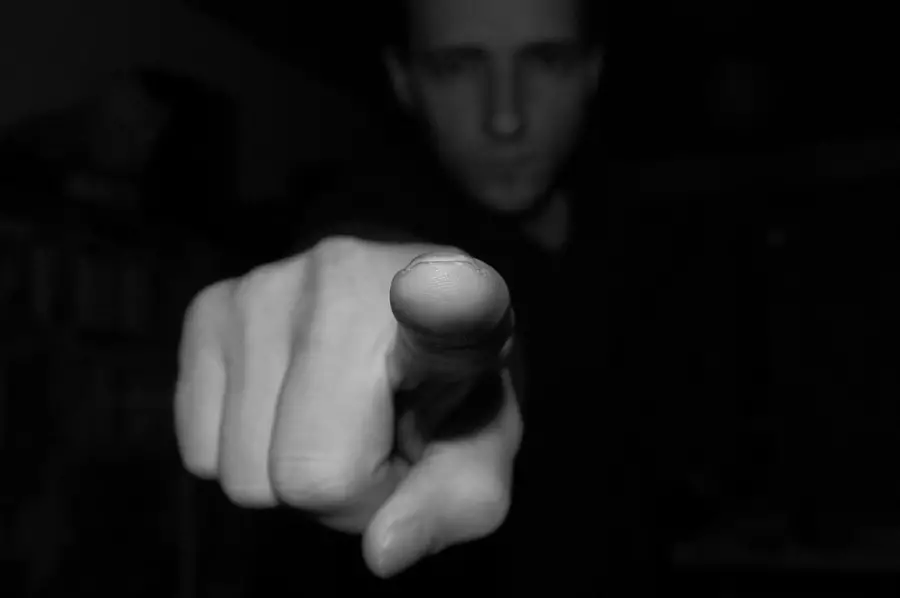
Gradually, as the relationship progresses, the love and validation that they were previously showing will begin to decrease. In addition to that, criticisms and devaluations will start to creep in.
You’ll think that this is just the normal next step after the honeymoon phase, as you’re both getting to really know each other.
No big deal, right?
The narcissist will start to become demanding and passive aggressive, including blaming you for things that you never said or did.
RELATED POSTS:
STAGE 4: Gaslighting

When things go wrong or you question the narcissist’s words or actions, you’ll be met with gaslighting. They will get you caught up in confusing conversations, which shift quickly and always seem to keep the narcissist free of accountability, while pinning everything back onto you.
They’ll very cleverly convince you that your thoughts and feelings are wrong and they’ll twist your perception of reality to their own self-serving agenda. Now everything is always your fault.
Take the quiz to find out if you’re being gaslighted.
| READ: 100+ Gaslighting Examples → |
| ↓ Get the FREE Gaslighting & Red Flag Checklists below when you join the email community! ↓ |
STAGE 5: Resignation

By this point, you’re exhausted. You try talking to the narcissist calmly and clearly to solve the problems, but somehow you always end up in confusing arguments.
You tell yourself, “No relationship is perfect, they all have issues. I just need to compromise a bit more.”
So, you resign yourself to the fact that maybe if you appease the narcissist and do it their way, you can get back to that first stage, which was filled with love, affection and good times.
STAGE 6: Loss of Self

Unfortunately, you never do get back to that first amazing phase.
Now every time you stand up for yourself or fight back against the narcissist’s despicable behaviour, things just get worse.
They project all of the things that they are doing onto you, then blame you for those very things. They’ll gaslight you to rewrite your version of events and cause mass confusion.
You’ve given up on attempting to regain those happy, early days of the relationship, now it’s all about surviving each day and keeping the peace.
Your confidence and self-esteem are shot.
STAGE 7: Addiction

By this point, you’re living in a constant state of stress and anxiety. You never know when the narcissist is going to explode, cause an argument or expect you to fix all of their problems and be a never-ending source of energy for them to feed from.
You now only feel relief when things are going ‘okay’ or the narcissist randomly grants you a breadcrumb of validation – both of which are in the narcissist’s complete control.
You become psychologically and chemically addicted to the highs and lows.
You are now completely dependent on the narcissist for relief and validation, much like a drug addict is reliant on their substance. This person is now your world, and you cannot leave.
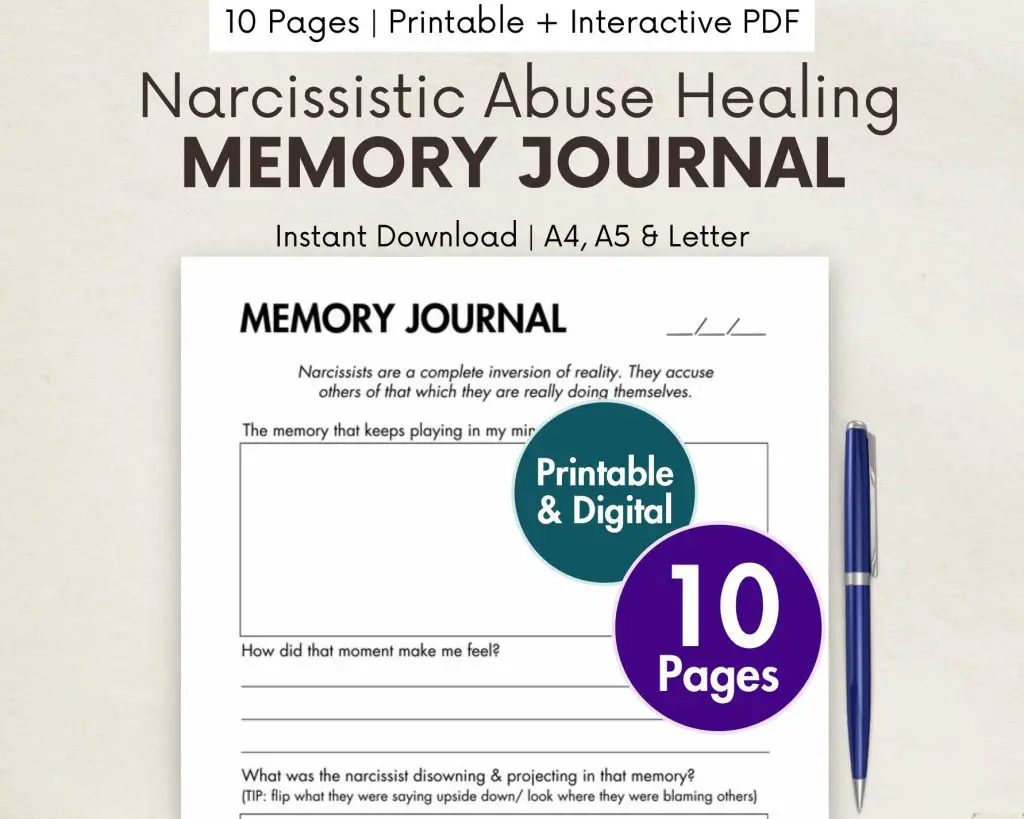
Memory Journal
Release the painful memories once and for all!
- Journal recurring thoughts
- Sort through what’s yours vs. theirs
- Identify your inner wounds to heal
- Return the narcissist’s disowned wounding
- Step-by-step guidance
- PRINTABLE & DIGITAL

How to Break Free From Narcissist Trauma Bonding

Although breaking free from a narcissist trauma bond can feel impossible, I can tell you from experience that it most definitely is possible!
After growing up as my narcissistic mother’s scapegoat, then spending the following twenty years married to a narcissistic husband, I had literally spent my entire life being narcissistically abused.
Yet, here I am on the other side of it all, completely free of narcissists and I’m healing and thriving every day.
So, let’s have a look at how to break a trauma bond.
Acknowledgment
The most important thing in breaking a trauma bond is in the acknowledgement of it.
When we’re stuck in a trauma bond, it’s hard to see anything beyond that’s playing out in our immediate world. Even though we feel awful and confused most of the time, we also know that things aren’t right and that we’re not experiencing the life we truly want.
When we’re ready to be completely honest with ourselves, only then are we able to acknowledge the poor treatment and abusive behaviour for what it is.
We will begin to realise that while someone’s trauma or tough childhood may explain why they are the way that they are, it in no way excuses their abusive treatment of others.
Acknowledging the abuse is the first step towards breaking free from it.
No or Low Contact
If you can immediately go No Contact with the narcissist, then I highly recommend doing so. This means blocking them from all forms of contact and not answering the door if they show up.
While this will be a tough period, given that narcissists do not like being ignored or discarded, it’s important to hold the line and not give in to them.
They will kick, scream, yell and throw a big old adult tantrum, so more power to you for not engaging.
If you cannot go completely No Contact due to shared children, property, family or business, the next best thing is Low Contact.
This is where you do not engage in any contact with them besides the bare essentials regarding your business together. Keep communication minimal and opt for written contact where possible (in case you need legal proof down the track).
If you’re still living with the narcissist and need to get out, protect yourself and do not tell them of your plans. Stash separate money aside and sort out your accommodation on the sly. Once you’re out safely, then you can inform the narcissist of the simplest of facts. Do not hand over any information that they do not need to know.
I made this mistake and told my narcissist ex that I was done and moving out, but I hadn’t actually secured another place to live yet. Let’s just say that was the most horrendous two months of my life, filled with suicide threats, gaslighting, crocodile tears and invalidations.
You cannot heal in the same space in which you are being abused.
Turn Within
The most important step in breaking free from narcissistic trauma bonding is by turning within and coming back home to yourself.
Throughout the abuse you could not have gotten any further away from your true self if you’d tried, which was exactly what the narc wanted!
Your priority now is in self care and self love – learning to love and accept yourself exactly as you are. It’s about meeting your inner child, giving them a big hug and telling them that you’ll never ever leave them again.
It’s about seeing and releasing every single trauma within you that had you programmed to believe that you needed to seek love, security and approval from an outside source.
Once you truly do the inner work and start healing yourself, you will never again subconsciously hand your power away to anyone else. You will never again accept unhealthy and toxic behaviour in your life.
You’ll be vibrating on such a level that narcissists cower from, because it’s filled with too much light for their dark souls.
I really hope know you know what a trauma bond with a narcissist looks like, you can feel empowered enough to able to break free from it. Now it’s time to take the journey towards the life you truly deserve and wish to be living.
Heal Yourself By Releasing the Trauma
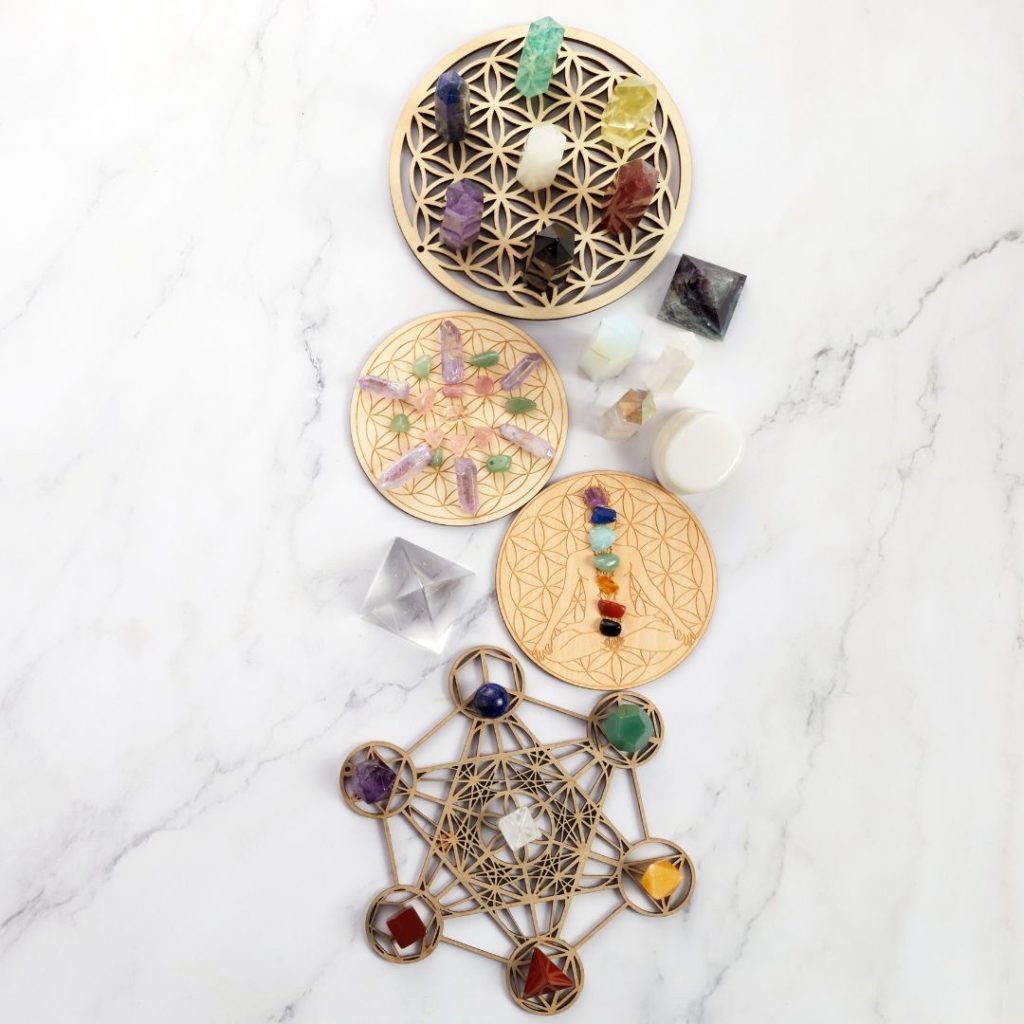
Energetic Healing from
Narcissistic Abuse
If you’ve tried everything to heal but still can’t shift things, it might be time to call in the spiritual realm.
✭ Removal of stuck energy
✭ Removal of old traumas & memories
✭ Past Life Regression
✭ Understanding your journey & how it’s shaped you
✭ Loving & non-judgemental guidance
✭ Psychic mediumship
✭ Ask your guides questions & get direct answers
10% OFF Code ‘UNMASK‘
www.selenahill.com →

